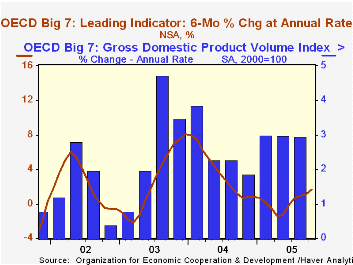 Global| Dec 12 2005
Global| Dec 12 2005OECD Leaders Rose Further
by:Tom Moeller
|in:Economy in Brief
Summary
The Leading Index of the Major 7 OECD economies posted its fifth consecutive monthly increase in October with a 0.4% increase that doubled the gains of the prior two months. The increase raised the leaders' six month growth rate to [...]

The Leading Index of the Major 7 OECD economies posted its fifth consecutive monthly increase in October with a 0.4% increase that doubled the gains of the prior two months. The increase raised the leaders' six month growth rate to 1.7%, the best since August 2004 and gains were broad based amongst countries.
During the last ten years there has been a 66% correlation between the change in the leading index and the q/q change in the GDP Volume Index for the Big Seven countries in the OECD.
The leading index for Japan jumped 0.9% after a downwardly revised 0.5% September increase. Share prices and construction rose lifting the six month growth rate to a firm 3.0% and its correlation with real economic growth in Japan has been a meaningful 42% during the last ten years.
Leaders in the European Union (15 countries) rose 0.3%. This fifth consecutive monthly increase raised the six month growth rate to 2.5%. During the last ten years there has been a 60% correlation between the change in the leading index and the q/q change in the GDP volume index for the European Union.
German leaders increased for the six consecutive month and a 0.7% gain was the strongest since July. The six month growth rate improved to 4.4% as new orders rose to the highest since 1992. The correlation between the leaders and the change in the German GDP volume index has been a low 19% during the last ten years.
The French leaders increased 0.5% increase and the gain pulled the six month growth rate further into positive territory at 1.5%. Prospects for the industrial sector rose to the best level in a year. The correlation between the leaders' growth and France's GDP volume index has been 43% during the last ten years. The Italian leading index were unchanged following two months of increase. Nevertheless, the six month growth rate improved to 0.3% though earlier growth rates were revised down. Its correlation with GDP growth has been a low 0.9% during the last ten years.
The U.S. leaders rose 0.2% following two months of decline and six month growth in the leaders improved to a modest 1.2%. The correlation between the leaders and real GDP growth has been a high 58% during the last ten years.
The UK leaders fell 0.1% for the second straight month. Declines in consumer confidence, new car registrations, share prices and the future tendency of production dropped the six month growth rate to -0.3% and its correlation with real GDP growth has been 29% during the last ten years. The Canadian leaders also fell for the second month and the 0.1% decline dropped six month growth to -0.8%. The correlation of the leaders' growth with Canadian real GDP has been 49% during the last ten years.
The latest OECD Leading Indicator report is available here.
Cross-Country Productivity Growth from the Federal Reserve Bank of St. Louis is available here.
| OECD | Oct | Sept | Y/Y | 2004 | 2003 | 2002 |
|---|---|---|---|---|---|---|
| Composite Leading Index | 103.37 | 102.99 | 1.0% | 102.36 | 97.84 | 96.45 |
| 6 Month Growth Rate | 1.7% | 1.1% | 3.6% | 2.7% | 2.3% |
Tom Moeller
AuthorMore in Author Profile »Prior to joining Haver Analytics in 2000, Mr. Moeller worked as the Economist at Chancellor Capital Management from 1985 to 1999. There, he developed comprehensive economic forecasts and interpreted economic data for equity and fixed income portfolio managers. Also at Chancellor, Mr. Moeller worked as an equity analyst and was responsible for researching and rating companies in the economically sensitive automobile and housing industries for investment in Chancellor’s equity portfolio. Prior to joining Chancellor, Mr. Moeller was an Economist at Citibank from 1979 to 1984. He also analyzed pricing behavior in the metals industry for the Council on Wage and Price Stability in Washington, D.C. In 1999, Mr. Moeller received the award for most accurate forecast from the Forecasters' Club of New York. From 1990 to 1992 he was President of the New York Association for Business Economists. Mr. Moeller earned an M.B.A. in Finance from Fordham University, where he graduated in 1987. He holds a Bachelor of Arts in Economics from George Washington University.
More Economy in Brief
 Global| Feb 05 2026
Global| Feb 05 2026Charts of the Week: Balanced Policy, Resilient Data and AI Narratives
by:Andrew Cates






